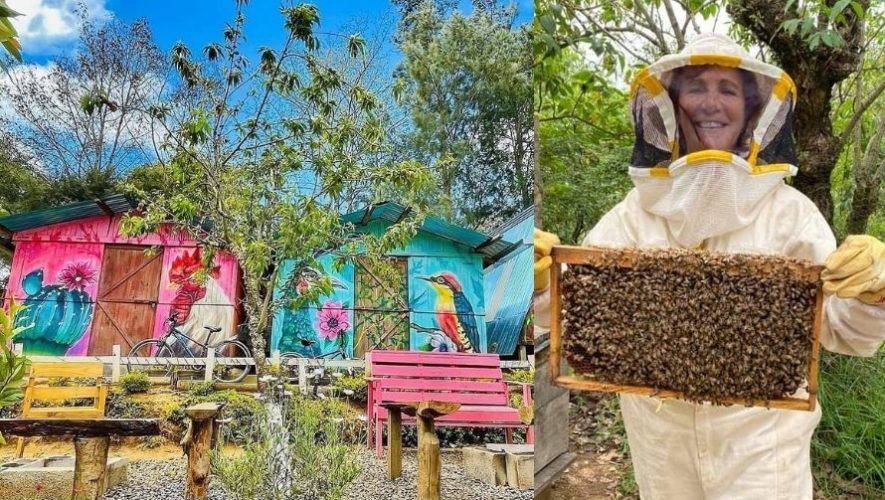RIO DE JANEIRO, BRAZIL – Beekeepers in Guatemala seek to maintain an environmentally friendly business in the Central American nation, despite existing threats such as the climate crisis or the recent poisoning of a million bees on a farm in the central region of the country.
Added to these factors is the Covid-19 pandemic, which, in addition to the more than 10,000 deaths in Guatemala and 340,857 positive cases accumulated in 16 months, has caused a reduction in bee production of about 27% in the last year.
Read also: Check out our coverage on Guatemala
Edwin Muñoz is one of the 3,335 beekeepers legally registered with the authorities in Guatemala, owner of the La Joya apiary, located some 50 kilometers southeast of the capital, where he keeps 150,000 bees, specifically the “apis mellifera” species, the most predominant in the region.

A member of the Association of Beekeepers for Integration and Sustainability (Apis), Muñoz assures Efe that the bee is considered “a sensor of the degree of contamination we have on the planet” and, as is known, “plays an indispensable role in pollination since 75 to 80% of vegetables are due to the transfer of pollen from bees.”
AN ANONYMOUS ATTACK
Despite the importance of bees in the ecosystem, the Bee Cabañas apiary, located in Antigua Guatemala, in the department of Sacatepéquez (center), some 35 kilometers west of the country’s capital, was attacked on June 24.
The complaint was quickly made public because of the poisoning of around one million of these bees, attacked by a “person with his face covered” who entered the apiary at night to place a chemical “that could have poisoned their hives”, according to the beekeeper Nel Juarez, who told local media after seeing the security recording of the place.
In addition to producing honey and other items, the insects were the main attraction of a tour to raise awareness about “the world of bees,” Juarez said.
For Muñoz, the criminal action in Bee Cabañas “is a priceless attack. It is a blow firstly to the environment and, secondly, to the producers because it discourages them.”
There are 5,012 apiaries and 3,335 beekeepers registered in the Guatemalan Registry of Beekeepers (Regapi) of the Ministry of Agriculture, Livestock, and Food (MAGA). More than 65% of them are located in the southwestern part of the country.
The agricultural and livestock frontier, the resulting climate crisis, water pollution, and the ignorance of some people, endanger the subsistence of these insects, which are vital for the species’ survival.
THE HONEY BOOM
According to the National Beekeeping Chain, Guatemala is considered a marginal producer of honey, with an average of 2,000 metric tons per year, far below, for example, the 305,000 metric tons produced by China.
The largest buyer of Guatemalan honey is Germany, which in 2020 imported 63% of the Central American country’s production, followed by Costa Rica and Spain, with 7% each.
Even though Guatemala barely consumes an average of one teaspoon of honey per person per year and in regions such as Europe, it reaches one kilo per inhabitant each season, the Central American country is experiencing a “boom” in beekeeping in recent years, according to the coordinator of the National Beekeeping Agro-chain, Marta Velásquez.
“Everyone sees honey as an export product and payment in euros since 75% of the honey we export is consumed in the European Union,” says the specialist.
Velásquez maintains that people tend to think only of honey, wax, and propolis in Guatemala. Still, instead, little is said about pollination, “which is vital for the recovery of the landscape, since bees maintain the native flora of this country.”
Guatemala also boasts an endemic bee called “melipona beecheii”, whose honeycombs, unlike the traditional box-grown ones, such as Muñoz’s, are cone-shaped, can be inside trees; their honey is more difficult to obtain.
Beekeepers specialized in the “melipona beecheii” have not joined the Agrocadena because the work is more arduous and less profitable, says Velásquez, but the bee is more attractive for tourism and beneficial nature of the Central American country.
Its prevalence, however, like the other “apis”, depends on the conscience of humanity that “has destroyed the forests, that does not contemplate the honeycombs, and that has an indolence that leads to tragedies like the one in the apiary of Sacatepéquez,” concluded Velásquez.

